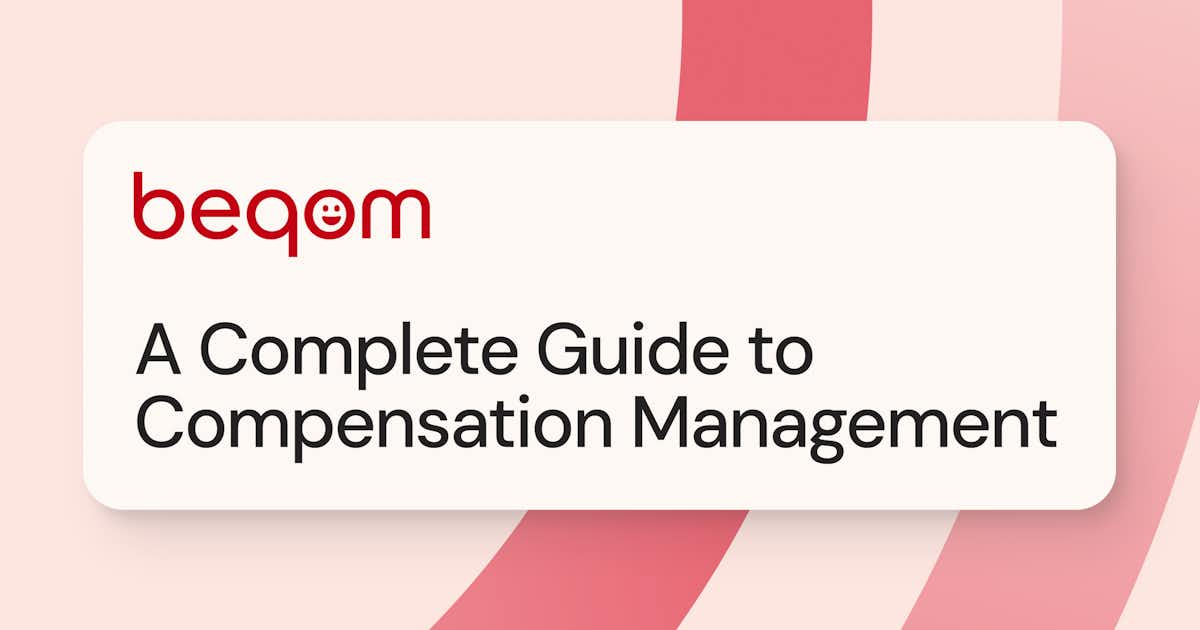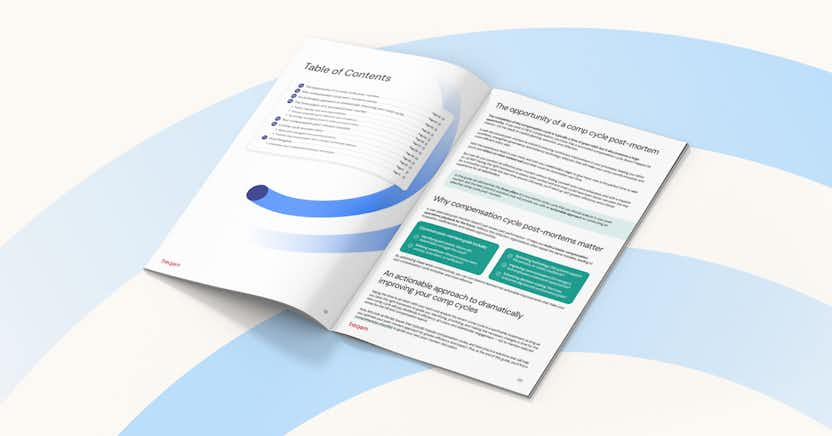A Complete Guide to Compensation Management

Effective rewards fuel great results. A fair and transparent compensation package is key to keeping employees loyal and engaged, and attracting new talent. When people feel valued and properly rewarded for their skills and contributions, they maintain a high performance level and drive the business forward. The correlation between happy employees and successful enterprises makes mastering compensation management essential for today’s managers.
But compensation is more than just distributing paychecks. It requires a thoughtful approach and the right tools. In this guide, we'll dive into the core aspects of compensation management, explore how it impacts the organization, and illustrate how businesses can harness purpose-built solutions like beqom's software to achieve tangible results.
What is compensation management?
Compensation management refers to the processes and practices used to design, implement, and monitor pay systems that reward employees for their contributions. It encompasses everything from salaries, bonuses, and long-term incentives to benefits and office perks. The primary objectives of compensation management are to attract, retain, and motivate employees while aligning with the company's overall strategy.
Total compensation management isn’t just about setting pay scales; it’s about creating a system that ensures fairness, equity, and transparency. For HR professionals, it also involves balancing internal budget constraints with the need to offer competitive compensation packages that help recruit top talent.
The different types of compensation
Today, businesses have numerous ways to show appreciation and reward employees beyond just a monthly salary. HR managers should recognize that each employee is driven by unique motivators and many associate job satisfaction with non-monetary incentives. Take a look at the types of direct and indirect compensation below.
Direct compensation
- Hourly Pay: Compensation for work completed based on the hours worked.
- Salary: A fixed payment not dependent on hours worked, typically distributed bi-weekly or monthly.
- Commission: Payment based on achieving specific sales or performance targets, often seen in sales roles.
- Bonuses: Additional one-time payments that reward exceptional performance or achieving specific milestones.
- Long-Term Incentives (LTI): Deferred compensation, such as stock plans or executive compensation that provides rewards over an extended period, often linked to the company’s long-term success.
Indirect compensation
- Benefits: Health insurance, retirement plans, and other financial perks.
- Overtime Pay: Compensation for hours worked beyond the regular schedule, typically at a higher rate.
- Office Perks: Non-monetary benefits such as free meals, gym memberships, and flexible working arrangements.
- Development Opportunities: Access to training, career development programs, and tuition reimbursement.
- Paid Time Off (PTO): Vacation days, sick leave, and other forms of compensated leave.
Compensation management has its own lexicon of terms. Refer to beqom’s compensation glossary for an overview of compensation terminology.
What is an example of effective compensation management?
To illustrate the real-world impact of effective compensation management, let’s explore Adecco’s notable success story. Adecco, a leader in HR services, implemented beqom’s compensation management software to manage its global salary review and variable compensation processes. Their existing system had become obsolete and required significant manual effort.
Adopting beqom’s software allowed Adecco to reduce administrative burdens significantly. Additionally, it helped them achieve greater accuracy and consistency in compensation across its global workforce. This transformation not only improved efficiency but also enhanced employee satisfaction. The software gave them a clearer understanding of their compensation packages.
A powerful feature of a compensation management system is the ability to fully personalize compensation strategies based on a company's specific needs. For instance, with beqom’s platform, you can tailor salary increases, bonuses, and long-term incentives to align with individual performance metrics and/or specific company objectives, as well as to meet employee needs and preferences. Companies use this flexibility to set up customized bonus schemes in line with corporate and regulatory guidelines. This allows HR managers to create different compensation structures for various departments, regions, roles, or even individual employees.
The importance of compensation management
We already highlighted how a well-structured compensation plan is essential for building a motivated, high-performing workforce. Indeed, companies that excel in compensation management see higher employee satisfaction, improved retention and productivity, and better alignment with their business goals.
However, compensation management also plays a critical role in supporting decision-makers. Salaries, bonuses, and other incentives must be carefully budgeted to balance retaining talent with maintaining the company’s financial health. Proper management ensures that compensation efforts are sustainable and aligned with the organization's resources.
Benefits of compensation management
Beyond just determining pay, a well-executed compensation management strategy is a powerful tool for businesses. Below, we explore major compensation management benefits and their impact on organizational growth.
Employee morale
Fair and transparent compensation systems enhance employee trust and job satisfaction. When employees understand how their pay is determined and believe it is equitable, they feel more valued, which positively impacts their engagement.
Recruitment
Competitive compensation packages are essential to attracting top talent. As the job market becomes more competitive, companies must offer appealing pay and benefits to stand out.
Talent retention
An effective compensation strategy helps organizations boost their talent retention efforts. Employees who feel fairly compensated are more likely to stay with their employer, reducing turnover rates and associated costs.
Productivity
Properly structured compensation not only motivates employees to work harder and smarter but also increases HR and managerial efficiency. Automation of compensation management processes frees HR teams to focus on strategic initiatives while minimizing errors and delays.
Alignment
Compensation management ensures that employee rewards align with the organization’s broader goals. For example, offering long-term incentives for executives tied to company performance fosters a culture where employees are motivated to work toward common objectives.
Cost optimization
By using compensation management software, organizations can analyze and control compensation spending effectively. This allows businesses to enforce budgetary guidelines, make informed pay decisions, and reduce unnecessary costs.
Transparency, audit, and compliance
A robust compensation management system ensures transparency in pay calculations, fostering trust among employees. Moreover, it facilitates compliance with legal and audit requirements, helping organizations avoid costly mistakes and penalties.
HR’s role in compensation management
Compensation management is a critical HR function influencing hiring, performance, and retention. HR managers are key in ensuring that compensation strategies align with the company’s broader goals and meet employee expectations.
Although software and platforms are powerful tools, only the right strategy can unlock their full potential. Even when aided by AI, the human touch is crucial in interpreting data, making informed decisions, and ensuring the system supports a fair and motivating compensation structure.
With compensation trends for 2024 emphasizing pay transparency, equity, and AI-driven solutions, HR’s role in configuring and managing these tools is more important than ever to create an engaged and productive workforce.
Best practices for effective compensation management
Effective compensation management comes with its own set of challenges, including high costs, complex administration, and the risk of miscommunication with employees. Managing multiple bonus structures and benefits across different regions can quickly become overwhelming without the right systems in place. Below, we will present the most effective strategies that you can employ to fully maximize the benefits of a compensation management platform.
Align with market trends
Have your HR team review salaries, bonus structures, and benefits annually to ensure they reflect current trends. Conduct regular market analysis and compensation surveys to stay competitive by offering fair compensation. Make use of tools like salary benchmarking platforms to compare industry compensation standards. If your industry is seeing a rise in remote work, consider offering flexible benefits like home office options or enhanced health benefits. Make sure to also adjust for regional salary differences, especially if you operate in multiple locations.
Apply a compensation philosophy
Define your company’s compensation philosophy early on to guide decision-making. If you focus on pay-for-performance, establish clear criteria for measuring performance using tools like performance management software. Metrics such as sales targets, project completion, or customer satisfaction scores can help inform decisions. For instance, a tech company might reward engineers with bonuses tied to project completion.
If equity is a priority, create a framework that ensures fair pay across roles, locations, and genders, and regularly audit compensation practices to address any disparities. Clearly communicate this philosophy to managers and employees to ensure transparency in pay decisions.
Utilize specialized software
Handling complex pay structures manually can lead to errors and inefficiencies. Eliminate these risks by implementing AI-powered performance and compensation management software. Then, watch HR teams streamline these processes effortlessly, improving efficiency and outcomes. For example, if you manage compensation across multiple regions with different currencies and tax regulations, beqom’s software can automatically adjust pay calculations for each location.
Additionally, by integrating pay equity software, you can leverage data-driven insights to make transparent, fair compensation decisions. This approach reduces administrative burdens and generates trust, precision, and a culture of fairness. Take immediate action by mapping out current processes and identifying weak points
Integrate AI
Incorporate AI for compensation management to analyze large datasets and provide predictive insights to optimize pay decisions. AI identifies imbalances and recommends adjustments based on employee performance and market trends. For example, AI can automatically flag underpaid high performers and suggest salary increases to prevent attrition of key talent.
It also automates tasks like bonus calculations, allowing HR to focus on more strategic initiatives. By integrating AI, you ensure data-driven compensation decisions, improve pay equity, and enhance retention while increasing efficiency across your compensation processes.
Ensure transparent communication
Transparent communication is key to building trust in your compensation processes. Implement real-time tools that allow employees to access their compensation data, such as personalized pay statements that break down salary, bonuses, and benefits. Regularly share updates on how compensation is determined, including the metrics used for performance-based pay and any changes to company-wide policies. By making this information easily accessible, you reduce confusion, increase transparency, and foster a culture of openness around compensation decisions.
Address the challenges and opportunities of compensation management with beqom
As compensation management continues to evolve, so do the challenges HR and management teams face. Issues like data security, cost control, and regulatory compliance require robust solutions.
With beqom’s innovative compensation management software, businesses can overcome these challenges by automating processes, ensuring transparency, and promoting equity across the organization. Additionally, beqom prioritizes data security, ensuring that all compensation data is protected according to the highest industry standards.
Harness the full potential of compensation management
Compensation management goes beyond simply distributing pay –- it’s about building a strategic system that motivates, retains, and satisfies employees while aligning with business goals.
This guide covered the core elements of compensation management, explored the benefits of a structured approach, and highlighted the importance of advanced tools like beqom’s software. By utilizing AI, promoting transparency, and automating processes, businesses can overcome challenges related to compliance, cost control, and employee retention.
When managed effectively, compensation becomes a powerful tool for driving long-term success and creating a fair, productive workplace. Contact us and learn how beqom’s software solutions can help increase your employee engagement, motivation, and productivity.















